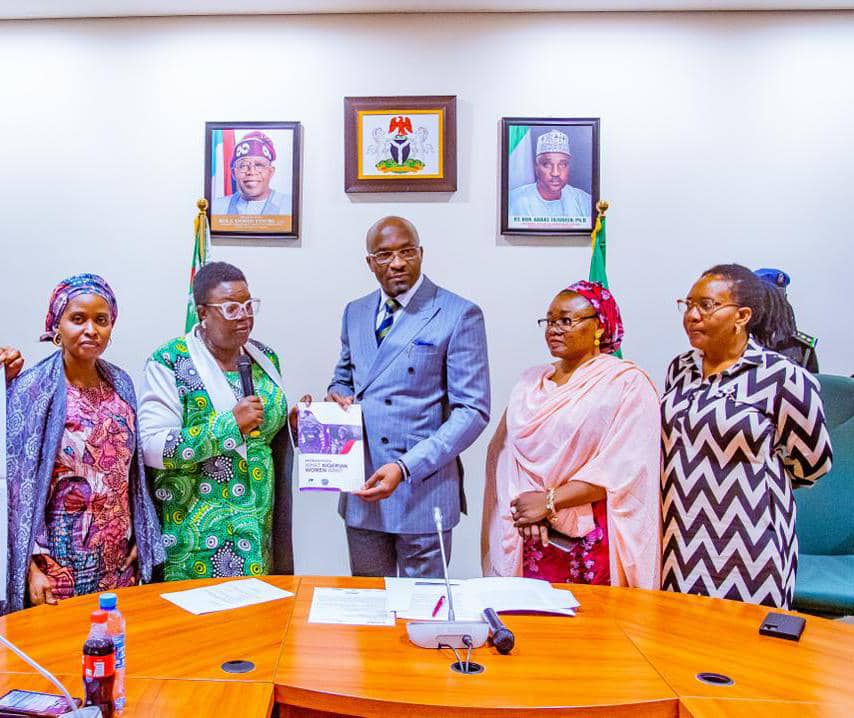Deputy Speaker of the House of Representatives, Rt. Hon. Benjamin Okezie Kalu has given a ray of hope on the 5 rejected gender bills, assuring that the 10th House would revisit them including those not accorded presidential assent.
Kalu gave the assurance on Tuesday when the Women Advocates Research and Documentation Centre (WARDC),
the NCAA, GECORN, Womanifesto and other Gender Bills Response Cluster members (GBRC) paid him a courtesy call in his office at the National Assembly, Abuja.

The Deputy Speaker who highlighted the appropriate sections in the constitution where amendment were sought for by the women said it was necessary to increase women participation in politics.
It will be recalled that the 5 bills failed to fly in the immediate past 9th National Assembly as they couldn’t secure the required majority votes.
He stressed that in a country like Nigeria where women and girls made up 49.32 per cent of the population, their number should reflect the proportion of representation in the majority of institutions, including the legislature with only 4% of women.
He commended the group for starting the advocacy early, urging them to also reach out to Nigerians in general for their support.
He said: “We are all aware that any society that is desirous of achieving equitable development, cannot sidestep such fundamental matters as gender equity and women empowerment. This is particularly important in a country like Nigeria where women and girls make up 49.32 per cent of the population. In real terms, this should reflect the proportion of representation in the majority of our institutions, including the legislature where we have only 4% of women.
“The 10th Assembly has the opportunity to further the rights of women and improve female participation in the political space but this is dependent on all stakeholders playing their role through advocacy for the five gender bills that recommend 35% affirmative action for women in political party administration, expand the scope of citizenship by registration, reserve a quota for women in Executive cabinet positions, reserve seats for women in Federal and state Legislative Houses and expand state citizenship rights, and all other such bills.
“I am glad that your organisations are commencing the gender bills advocacy early enough, as we are at the point where all hands need to be on deck for us to successfully crystalize these rights.
“I can assure you that having come at the right time, some of these sections that you are concerned about in our constitution like section 26 (2) paragraph 8; section 31 and section 318(1) to allow women claim their husband’s state at least after 5 years of marriage; section 223 to ensure that women occupy 35 percent in the spirit of affirmative action and section 147 that has to do with ministerial and commissioners appointment; section 192 that preaches for 35 percent for women to be nominated as well as reserved seats in section 48, 49, 91 to create additional 37, 74 and 108 seats for women in both Senate and House of Representatives, all these sections will be under the review that we are about to commence.
“We will find out why it did not sail through the last time and find how we can use legislative interventions to make even the ones that we pushed to Mr. President that were returned without the Presidential assent, you can count on us that this parliament is the people’s parliament and we will work together with you to make sure that this equity, this equality, the inclusion that you seek becomes yours if not completely but comfortably solved.
“I’m happy that I’m the chairman of the constitution review committee of the House of Representatives. I believe there’s a lot women have done to build people like us to greatness and if given the opportunity anywhere, they can do a lot of greatness towards nation building”.
Earlier in her presentation, the founding Director of Women Advocates Research and Documentation Center (WARDC), Abiola Akiyode Afolabi said they were in the House to seek support of Deputy Speaker in the reintroduction of the gender bills.
“We the members of the Gender Bills Response Cluster, seek your support to reintroduce discussion on the five gender bills at the floor of the House. As you are aware, as part of the Constitution Review process, the 9th National Assembly voted against five amendment bills, popularly known as the “gender bills”, aimed at using our apex law — the Constitution — to address certain issues affecting women and, in so doing, promote women’s rights in relation to citizenship, indigeneship, and political inclusion and participation”, she said.







